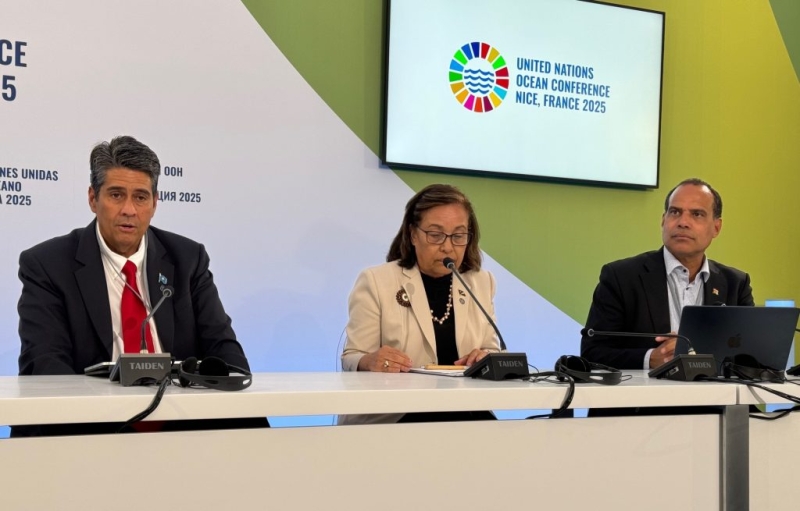- India Sees 9% Drop in Foreign Tourists as Bangladesh Visits Plunge |
- Dhaka Urges Restraint in Pakistan-Afghan War |
- Guterres Urges Action on Safe Migration Pact |
- OpenAI Raises $110B in Amazon-Led Funding |
- Puppet show enchants Children as Boi Mela comes alive on day 2 |
Pacific Leaders Urge Bold Ocean-Climate Action at UN Meet

Pacific Island leaders address the media at the 3rd UN Ocean Conference in Nice.
“There is no climate action without ocean action,” President Hilda Heine of the Marshall Islands told reporters, as she and other Pacific island leaders reiterated the urgent need for countries to honor their climate commitments.
“The ocean is bearing the brunt of our failure to address climate change and transition away from fossil fuels,” she added.
Heine emphasized that countries’ Nationally Determined Contributions (NDCs) must outline clear transitions toward renewable energy in line with the 1.5°C target under the Paris Agreement.
President Surangel Whipps Jr. of Palau stressed that protecting the oceans requires countries to deliver on 1.5°C-aligned NDCs. He called on all nations, particularly major emitters in the G20, to meet these commitments by September. “We need to adapt to shield our oceans from further harm. And that means, plain and simple, money—and money that we can use,” said Whipps Jr.
On the second day of the UN Ocean Conference, Pacific island leaders spoke to reporters after the Pacific-France Summit with President Emmanuel Macron. The discussion focused on how France could support climate resilience in the Pacific. They expressed hope that Macron would advocate for their cause within the EU, G20, and G7.
Heine acknowledged that the summit was not a “formal negotiating venue,” but rather an opportunity to share the Pacific’s concerns.
Whipps Jr. invited Macron to invest in the Blue Pacific Prosperity Initiative and the Pacific Resilience Fund. “The gap between what we need and what we have is growing dangerously wide,” he said. Macron reportedly committed to investing in regional climate financing, while Whipps stressed the importance of ensuring such funds reach affected communities promptly.
“In the Pacific, our security depends on climate action,” said Ralph Regenvanu, Vanuatu’s Minister of Climate Change Adaptation, Meteorology and Geo-Hazards, Energy, Environment and Disaster Management. “Without climate action, we face a very dangerous future.”
Conferences like the Ocean Conference offer underrepresented communities and smaller nations a global platform to raise their challenges and push for progress—however incremental.
“A lot of the changes at the international level come from coalitions of the willing,” said Regenvanu. He noted that nearly 50 countries have ratified the Agreement on Marine Biodiversity of Areas Beyond National Jurisdiction (BBNJ), and 37 nations have issued moratoriums on seabed mining.
“It’s how you get to change—by building support,” he added.

